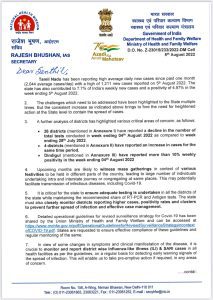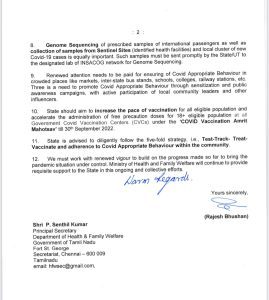Centre writes to Karnataka, Tamil Nadu, Andhra Pradesh and Kerala to closely monitor the Covid-19 situation ahead of the festive season.

The Centre has advised the southern states to increase testing. (Representational image)
With some of the southern states, including Tamil Nadu and Karnataka, reporting a significant increase in Covid-19 cases in the last one month, the Union Ministry of Health and Family Welfare has sent out a letter warning the states and asking them to contain the spread.
In a letter written to the Tamil Nadu government, the ministry noted that the state has been reporting high average daily new cases for the past one month (2,044 average cases/day) with a high of 1,211 new cases reported on 5 August.
The state has also contributed to 7 .7 percent of lndia’s weekly new cases and had a high positivity of 4.97 percent in the week ending 5 August, it said.

Letter written by Rajesh Bhushan, Secretary, Department of Health and Family Welfare/Supplied
The five states that have breached the 10,000 mark and are reporting the highest active cases include Karnataka, Kerala and Tamil Nadu with 11,403, 11,786 and 10,598 cases, respectively. The other two are Punjab (11,318) and Maharashtra (11,906).
The Centre’s letter notes that while it has highlighted the challenges several times in the past, the current surge in numbers “brings to fore the need for heightened action at the State level to contain the spread of cases”.
Doctors and epidemiologists have for some time now been saying that there is an increase in the number of infections and the reason it is not getting picked up is the reduction in testing. Officials, however, seem to be highlight the low hospitalisations to say that there is no reason to worry.
“With infections spreading, but decrease in hospitalisation, a certain inertia and complacency has set in among people. They do not even volunteer for testing. If the number of tests go up, infections can be caught early,” said Dr Manjunath CN, a member of the Technical Advisory Committee for Karnataka.
Meanwhile, the Centre, in its letter, has provided an analysis of cases in districts and highlighted the critical areas of concern, including falling test numbers and increasing positivity rates, in just the last one week.
Dr Gagandeep Kang, renowned microbiologist, told South First: “The number of hospitalisations will be less due to the fact that a majority of the population in India is vaccinated or immune to the infection. However, if the number of infections go up, naturally the number of people falling sick will also go up.”

Letter written by Rajesh Bhushan, Secretary, Department of Health and Family Welfare/Supplied
With beginning of festival season, the Centre has warned that the states are likely to witness mass gatherings that could lead to a surge in cases.
“Upcoming months are likely to witness mass gatherings in context of various festivities to be held in different parts of the country, leading to large number of individuals undertaking intra and inter-state journey or congregating at same places. This may potentially facilitate transmission of infectious diseases, including Covid,” the letter noted.
The Centre has asked states to closely monitor districts reporting higher cases, positivity rates and clusters to prevent further spread of the infection.
It has also asked states to take note of any new symptoms and clinical manifestations of the disease. It stressed that extra attention should be given on reporting and identifying lnfluenza-like illness (lLl) and severe acute respiratory illness (SARI) cases in all health facilities.
States have been asked to insist on Covid-appropriate behaviour, especially masking in crowded places.
The states have also been asked to ensure proper genome sequencing of international passengers as well as local cluster cases.
“Such samples must be sent promptly by the State/UT to the designated lab of INSACOG network for genome sequencing,” the letter stated.

Feb 08, 2024

Jan 31, 2024

Jan 27, 2024

Jan 29, 2024

Jan 20, 2024

Jan 16, 2024